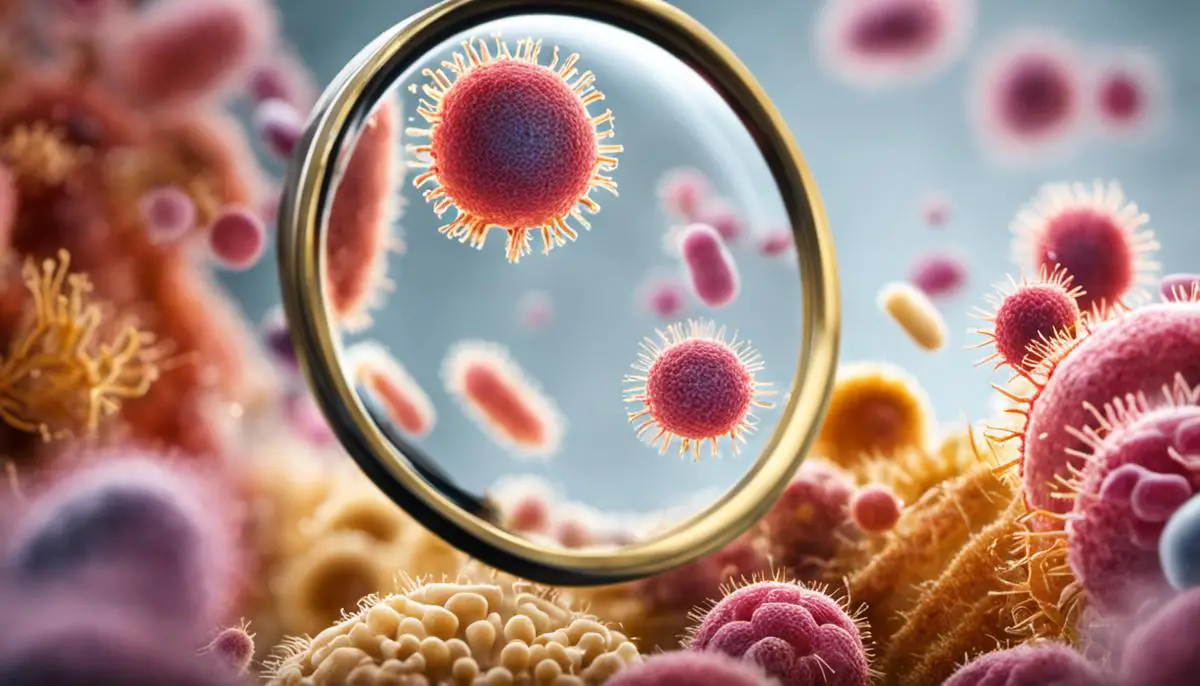The human body is a complex system that thrives on balance, particularly when it comes to our gut health. With the rise in awareness regarding overall wellness and health, probiotics have taken center stage in discussions about gut health. These live microbes, traditionally found in fermented foods, have been revealed to offer a host of benefits, especially for our digestive system. Though gut health is complex and varies from person to person, a well-established fact is the critical role that probiotics play in maintaining it. This exploration covers not just what probiotics are and their general health benefits, but also the link between these beneficial bacteria and gut health, the types of probiotics that promote gut health, and foods that naturally contain probiotics. Furthermore, it will delve into the realm of probiotic supplements and shed light on recent scientific studies that further elucidate the benefits of probiotics for gut health.
Understanding Probiotics
Understanding Probiotics
Probiotics are live bacteria and yeasts that are beneficial for your health, especially your digestive system. Often referred to as “good” or “friendly” bacteria, probiotics fight against harmful bacteria to maintain a balance in your gut, supporting your body’s ability to absorb nutrients and fight infection. They are naturally present in your body, but you can also gain them from certain foods and supplements.
The Origins of Probiotics
The concept of probiotics originated with Russian scientist and Nobel laureate Elie Metchnikoff, who in the early 20th century suggested that it would be possible to modify the gut microbiota and to replace harmful microbes with useful ones. The term “probiotic,” which means “for life,” was coined in the 1960s, and since then, these beneficial microorganisms have been extensively studied.
Probiotic Strains and their Health Benefits
There are several different strains of probiotics, each with its unique health benefits. Lactobacillus and Bifidobacterium are two of the most common types. Lactobacillus, which is found in yogurt and other fermented foods, can help with diarrhea and may help people who cannot digest lactose, the sugar in milk. Bifidobacterium, found in some dairy products, may help alleviate the symptoms of irritable bowel syndrome (IBS) and some other conditions.
Probiotics and Gut Health
The importance of gut health has become increasingly recognized in recent years. The gut, or intestinal tract, is not just a component of the digestive system; it is also an essential component of the immune system, containing 70-80% of the body’s immune cells.
Probiotics assist in preserving gut health by maintaining a balance between beneficial and harmful bacteria in your digestive system. They can help with a variety of digestive issues, such as antibiotic-associated diarrhea, infectious diarrhea, and constipation, among other conditions.
Additionally, emerging research suggests a potential role of probiotics in promoting mental well-being. This concept, known as the gut-brain axis, postulates that the health of your gut can significantly influence your mood and mental health. Probiotics, therefore, may have a role in managing depression and anxiety.
Exploring the Benefits and Considerations of Probiotics for Gut Health
In order to optimize gut health with probiotics, one must pay attention to the strain of the probiotic, the dosage or Colony Forming Units (CFUs), and the source from where it is obtained. To navigate this journey towards better gut health, guidance from healthcare professionals or registered dietitians may prove beneficial. They can help ensure that your chosen probiotic perfectly complements your specific health needs.
However, it is crucial to bear in mind that while the potential advantages of probiotics are substantial and promising, extensive research in the field is still ongoing. Generally, probiotics are safe to consume for most people, but some may experience mild side effects like gas and bloating. Hence, it’s prudent to consult your doctor before incorporating any new dietary supplement to your routine.

The Connection Between Probiotics and Gut Health
All About Probiotics and Gut Health
The intricacies of our body health are being increasingly studied, with gut health being a significant area of focus. The action of probiotics is central to the functioning of the gut. Probiotics, essentially the “good” or beneficial bacteria and yeasts, are found in abundance in fermented foods, specific dairy products, and dietary supplements. Once consumed, these resilient microorganisms survive digestion and populate in the gut.
The Interplay Between Probiotics and Gut Flora
Each person possesses a unique variety of gut bacteria — referred to as gut flora or the gut microbiome. This microbial ecosystem is vital for many body functions, from digestion and absorption of nutrients to immune system regulation. That balance, however, can be easily upset by factors like stress, diet, antibiotics, and illness.
This is where the role of probiotics becomes crucial: they contribute positively to gut flora by supplementing the existing beneficial bacteria. Regular intake of probiotics helps sustain a balanced microbiome, even replenishing good bacteria after periods of illness or antibiotic use that may have led to their reduction.
The Role of Probiotics in the Digestive System
Our digestive functionality heavily relies upon gut health — and that’s where probiotics come into play. These good bacteria aid in breaking down food and extracting nutrients, thereby enhancing digestive efficiency. By doing so, probiotics can help ease common digestive woes like bloating, constipation, and diarrhea.
Certain types of probiotics have also proven useful in managing symptoms of some gastrointestinal disorders. For instance, Bifidobacterium and Lactobacillus strains can help alleviate the symptoms of conditions such as Irritable Bowel Syndrome (IBS).
Using Probiotics for Gut Health
Incorporating a variety of probiotics into our diet can have a positive impact on overall gut health. Recognizing that each type of probiotic is made up of different strains — each having unique benefits — is crucial when deciding your probiotic intake.
Although probiotics are generally considered safe, mild side effects like gas and bloating can occur. For those with severe illnesses or compromised immune systems, it’s advisable to consult a healthcare professional before starting a probiotic regimen.
Preserving gut health isn’t only about probiotics — a balanced diet rich in fiber, proper hydration, and stress management all play important roles. With our gut health so closely tied to overall wellbeing, looking after this vital part of your body’s ecosystem becomes equally important.

Types of Probiotics Beneficial for Gut Health
Understanding Probiotics
The term ‘probiotics’ refers to live bacteria and yeasts that provide numerous health benefits, particularly for the digestive system. Our bodies accommodate a multitude of these microorganisms, encompassing both ‘good’ and ‘bad’ bacteria. Maintaining a balance between the two is pivotal for our overall health. When harmful bacteria multiply, probiotics can help reestablish the balance. Lactobacillus and Bifidobacterium are two major groups of probiotics, each hosting different strains, which offer diverse health benefits, notably in the realm of gut health.
Lactobacillus Strains for Gut Health
Lactobacillus is one of the most common probiotics and exists naturally in the digestive, urinary, and genital systems. It is also present in yogurt and other fermented foods. This group of bacteria helps break down food and absorb nutrients. Several strains under Lactobacillus are particularly beneficial for gut health. These include Lactobacillus acidophilus, which increases lactose tolerance and enhances overall intestinal health. Lactobacillus plantarum has anti-inflammatory properties that are beneficial for people with Irritable Bowel Syndrome (IBS). Meanwhile, Lactobacillus rhamnosus has been proven to prevent and treat gastrointestinal infections and diarrhea.
Bifidobacterium Strains for Gut Health
Bifidobacterium, like Lactobacillus, lives in the intestines and stomach. Bifidobacterium helps limit the growth of harmful bacteria in the gut, aids in digestion, and supports the body’s defense against harmful bacteria. Specific Bifidobacterium strains show promise in supporting gut health. Bifidobacterium longum subspecies infantis aids in stomach discomfort and bloating while reducing symptoms in patients with IBS. Bifidobacterium bifidum assists the body in digesting dietary fiber and other complex carbohydrates that can otherwise cause discomfort. Another beneficial strain is Bifidobacterium breve, which supports a healthy digestive environment.
Saccharomyces Boulardii
Saccharomyces boulardii, although a yeast and not a bacterium, is also considered a probiotic effective for gut health. This particular probiotic can combat diarrhea and other digestive problems. It can also play a role in treating conditions like IBS, Crohn’s disease, and ulcerative colitis.
Streptococcus Thermophilus
Streptococcus thermophilus, often found in dairy products, is another essential probiotic for gut health. It can fight harmful bacteria and reduce the risk of antibiotic-associated diarrhea. Additionally, it can enhance the efficacy of lactose digestion and alleviate symptoms of lactose intolerance.
Functional Foods and Dietary Supplements
Probiotics can be acquired from two primary sources: functional foods and dietary supplements. Functional foods like yogurt, kefir, sauerkraut, and soft cheeses are naturally rich in probiotics. Additionally, dietary supplements, in the form of capsules, tablets, powders, or liquid extracts, provide another method to incorporate probiotics into daily health routines. Yet, it’s essential to remember that these products are not as stringently regulated as pharmaceuticals. Therefore, factors like potency and purity may vary considerably from product to product.
Prebiotics – Fuel for Probiotics
Probiotic bacteria need fuel to thrive and that’s where prebiotics come in. Prebiotics are dietary fibers that the human body cannot digest, but they act as food for probiotics, promoting their growth and functionality. Foods rich in prebiotics include garlic, onions, bananas, and whole grains. Ingesting a combination of both probiotics and prebiotics can have a symbiotic effect, which can significantly enhance gut health.
Understanding Probiotics
Before diving deeper into the world of probiotics, please note the importance of proper consultation. While generally regarded as safe, probiotics can sometimes lead to minor digestive issues such as gas. They should also be approached with caution by individuals with compromised immune systems or severe illness. It’s therefore recommended to always consult with a healthcare provider prior starting any new supplement regimen.
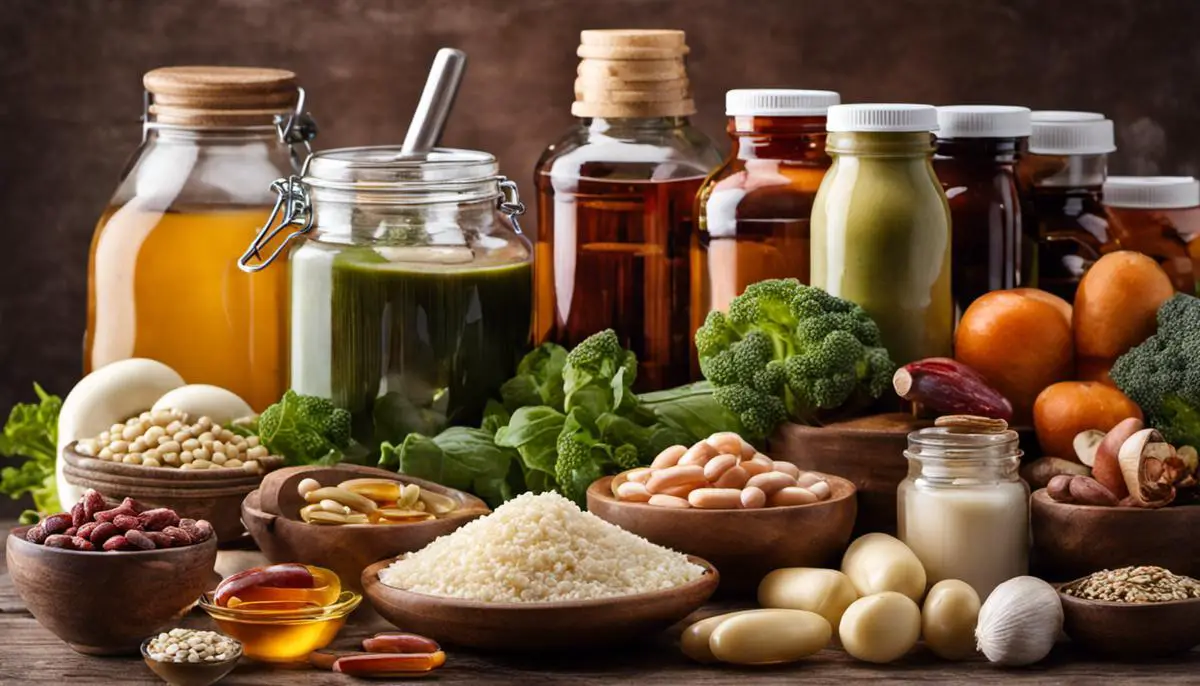
Foods That are Good Sources of Probiotics
Probiotics: The Good Bacteria Your Gut Needs
Probiotics, the ‘good’ or ‘friendly’ bacteria, are crucial for your health, with particular emphasis on your digestive system. Our bodies are teeming with diverse bacteria, some are beneficial while others not so much—probiotics belong to the beneficial category. They play a multitude of roles in maintaining our health. Not only do they assist in digesting food, but they also help in thwarting disease-causing cells and contributing to vital vitamin production. These friendly bacteria are essential for maintaining balance and promoting gut health.
Foods That are Good Sources of Probiotics
There are numerous foods that are naturally rich in probiotics, providing various health benefits when consumed regularly.
Yogurt is one of the best-known sources of probiotics. It’s made from milk that has been fermented by friendly bacteria, mainly lactic acid bacteria and bifidobacteria.
Kefir is a fermented probiotic milk drink made using kefir grains and cow’s or goat’s milk. It is a better source of probiotics than yogurt because during its fermentation process, the probiotics can colonize the gut more efficiently.
Another fermented food, Sauerkraut, made from fermented cabbage, contains natural probiotics and can boost your immune function and digestive health. Similarly, Kimchi, a Korean version of fermented cabbage, is another rich source of probiotics and is known to help with digestion issues.
Adding fermented foods to your diet helps increase your probiotics intake. Foods such as Miso, a Japanese fermented soybean paste, and Tempeh, a fermented soy product, are packed with a good amount of probiotics.
Pickles, or cucumbers that have been pickled in a solution of salt and water, are a great low-calorie, probiotic-rich food.
Enhancing Probiotic Intake Through Diet
One way to escalate your probiotic intake is by integrating more fermented foods into your regular diet. Adding sauerkraut or pickles as a topping to your salads, or serving them as an accompaniment to your main dish can be beneficial. Stirring miso into your soups, marinades or salad dressings is another great way to amplify your probiotic consumption.
Ensure to opt for traditionally fermented foods, and always check the labels before purchasing. Those tagged with “live and active cultures” are likely to encompass a noteworthy quantity of probiotics.
Incorporating probiotic-dense beverages like kombucha and kefir in your diet can also be advantageous. However, keep in mind that the probiotic content varies depending on each product, making label checking vital.
Although you can source probiotics from food, some people may need to resort to supplements to reach the targeted intake, especially for those wrestling with specific health issues. Always seek advice from a healthcare provider before initiating any new supplement intake.
Let’s not forget to strike a balance in your diet with both prebiotic foods — fuel for probiotics such as fruits and vegetables — and food rich in probiotics to boost your gut health.
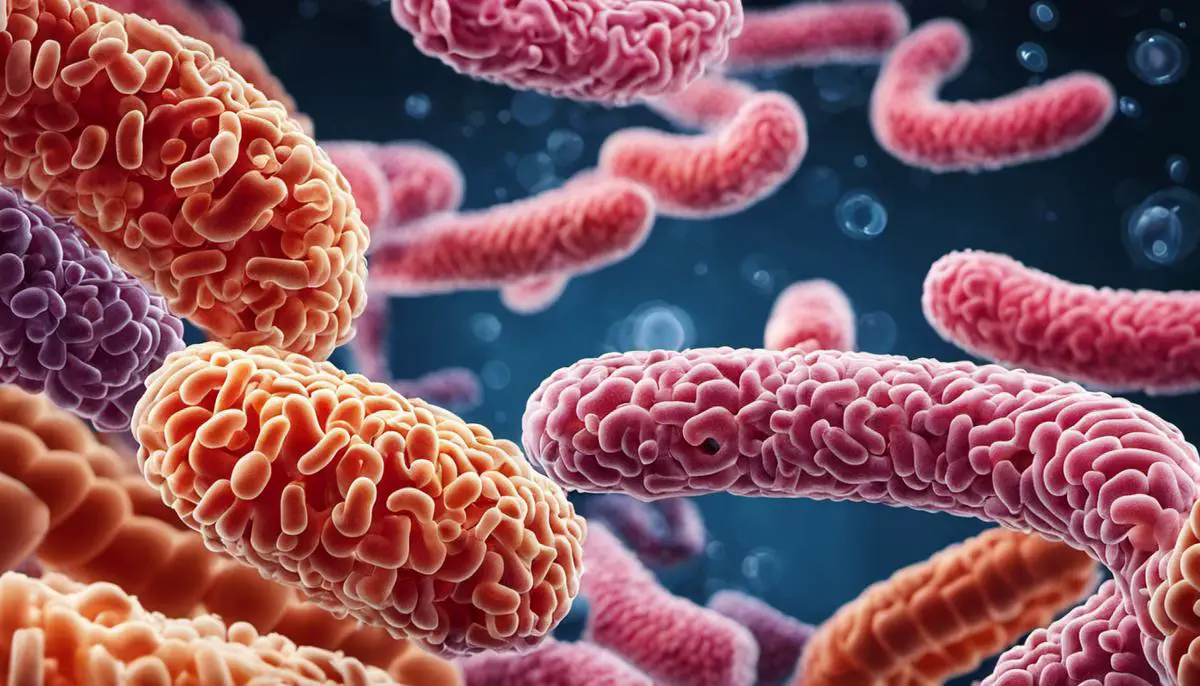
Supplementing with Probiotics
Unraveling the Connection Between Probiotics and Gut Health
Probiotics, living microorganisms known colloquially as “good” or “friendly” bacteria, offer a plethora of health advantages when consumed in the right quantities. These microscopic allies are critically vital to our general wellbeing, with a particular emphasis on our digestive health. The human gut is a melting pot of these microbes, which form a community known as the gut microbiota. Keeping this community balanced is integral to the optimal operation of our digestive tract, bolstering our immune system, and much more.
The Need for Probiotic Supplements
The typical Western diet, stress, lack of sleep, and certain medications can disrupt the balance of our gut flora. This imbalance, known as dysbiosis, can trigger various health issues such as obesity, diabetes, depression, and gut-related problems like irritable bowel syndrome (IBS). Probiotic supplements, which provide a concentrated dose of certain types of bacteria, are often recommended in such cases to restore the balance.
In addition to addressing health issues, probiotic supplements may help healthy people maintain their well-being. People who want to strengthen their immune system, improve digestion, lower the risk of antibiotic-associated diarrhea, or enhance their mental health may consider taking probiotic supplements.
It’s important to note that not all people will need to supplement with probiotics. For the majority, a diet rich in diverse fibers from various plant sources can feed the gut microbes sufficiently.
What to Look for in a Probiotic Supplement
When it comes to probiotic supplements, diversity and quantity matter. Different probiotics perform different roles, so a supplement containing a variety of probiotics may be more beneficial. Look for supplements listing the genus, species, and strain of the probiotics, as this information helps determine the health benefits you may expect.
Also, make sure to check the colony-forming units (CFUs), which indicate the number of viable bacteria in the supplement. While the necessary CFU count may depend on your specific health needs, most off-the-shelf probiotic supplements would offer between 5 to 10 billion CFUs per dose.
Considerations and Potential Side Effects of Probiotics
Probiotics, while generally deemed safe, may cause side effects, especially during their initial usage. Digestive discomfort in the form of mild bloating or gas may occur in some individuals, but these typically fade after a few days of consistent use.
Rare but serious side effects could surface in people with a compromised immune system or individuals with prolonged hospital stays, including those with a central venous catheter. Seeking advice from a healthcare professional before introducing a new supplement to your dietary regimen is always recommended.
It’s important to note that the quality of probiotic supplements can vary. Some may not contain the volume of live organisms that the packaging claims, or they may have strains that are not conducive to their purported benefits. Hence, patronize reputable manufacturers and if you can, opt for supplements that have undergone third-party testing to assure potency and quality.
Remember, probiotics are supplements and should not be considered substitutes for a balanced diet. Consuming a variety of nutritious food like fruits, vegetables, whole grains, lean proteins, and healthy fats is the most effective approach to enhancing gut health. Incorporating regular exercise, getting adequate sleep, and managing stress are also fundamental in nurturing a balanced gut microbiota.
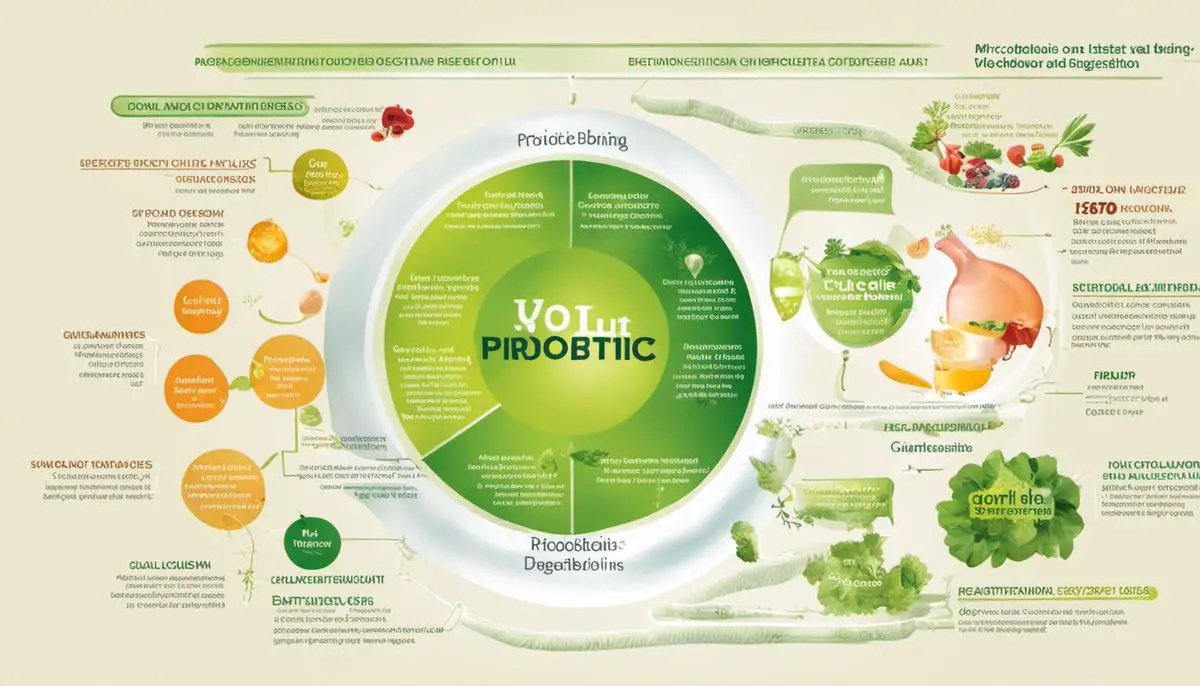
Scientific Studies Supporting Probiotic Benefits
The Role and Significance of Probiotics in Gut Health
Probiotics – live yeast and bacteria – are good for your health, particularly your digestive system. Although our bodies are home to a mix of good and bad bacteria, an imbalance can occur when the harmful bacteria outnumber the beneficial ones. Probiotics can aid in resolving this by replenishing your gut with healthy flora, thereby restoring balance in your digestive health.
Scientific Evidence Supporting Probiotic Benefits
There have been numerous scientific studies supporting the health benefits of probiotics. For instance, a meta-analysis conducted in 2014 and published in the Journal of the American Medical Association (JAMA) found that probiotics significantly decrease antibiotic-associated diarrhea (AAD). The researchers concluded that probiotics should be included into the clinical practice guidelines for AAD.
Probiotics and Irritable Bowel Syndrome
In a 2020 systematic review and meta-analysis of 53 randomized controlled trials, published in BMJ Gastroenterology, it was found that probiotics significantly improved the overall symptom response in individuals with Irritable Bowel Syndrome (IBS). The study suggests that probiotics can be considered as an adjunct treatment for individuals with IBS.
Promoting Gut Health Through Probiotics
Probiotics also show promising results in Ulcerative Colitis (UC), a type of inflammatory bowel disease causing inflammation in the digestive tract. A 2020 scientific report published in the journal Nature found that probiotics contribute to the health of the gut by enhancing the function of the gut lining, thus reducing inflammation in UC patients.
Probiotics and Clostridium Difficile-Associated Diarrhea
Clostridium Difficile, a bacterium that can lead to life-threatening infections, is also getting checked by probiotics. A 2017 scientific review published in The Lancet reported substantial benefits for the use of probiotics in the prevention of Clostridium Difficile-Associated Diarrhea (CDAD) in patients taking antibiotics. The study found a significant reduction in CDAD in patients who took probiotics in conjunction with their antibiotics.
The Role of Probiotics in Necrotizing Enterocolitis
Probiotics are found to reduce the possibility of necrotizing enterocolitis (a serious disease that affects the intestines of premature infants) by 50%. A scientific research study published in The Lancet in 2020 on premature babies suggests that trusted probiotics should be used routinely as a safe and cost-effective intervention.
Conclusion
From maintaining normal gut function to preventing severe gastrointestinal diseases, probiotics play a significant role in promoting gut health. The scientific community’s current consensus emphasizes the potential of probiotics, although further research is needed to determine specific strains and dosages for each medical condition. Meanwhile, probiotics offer an exciting avenue for boosting gut health and associated overall well-being.
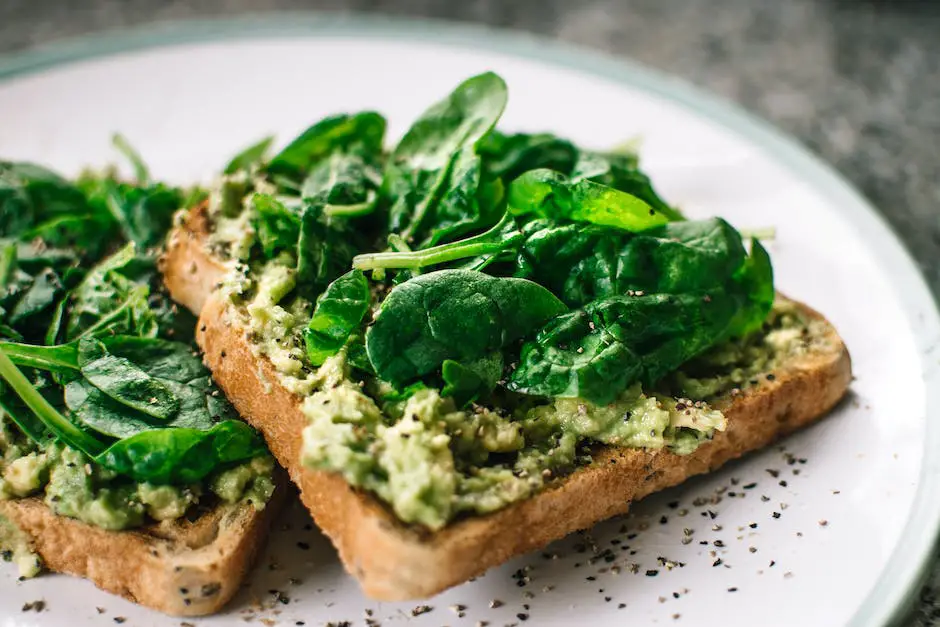
Indeed, the world of probiotics is vast and increasingly becoming an essential part of our understanding about gut health and overall well-being. The fact remains that a healthy gut is key to a healthy body and mind, and probiotics can play a pivotal role in maintaining this balance. Whether through natural sources like food or through supplements, these beneficial bacteria are revolutionizing the health industry. The key lies in being informed, understanding your body, and incorporating what suits you best. As we continue to learn more about probiotics and their health benefits, it beckons us to embrace a more balanced lifestyle to cultivate happier, healthier lives.
